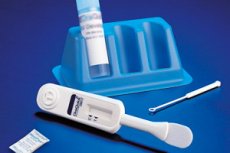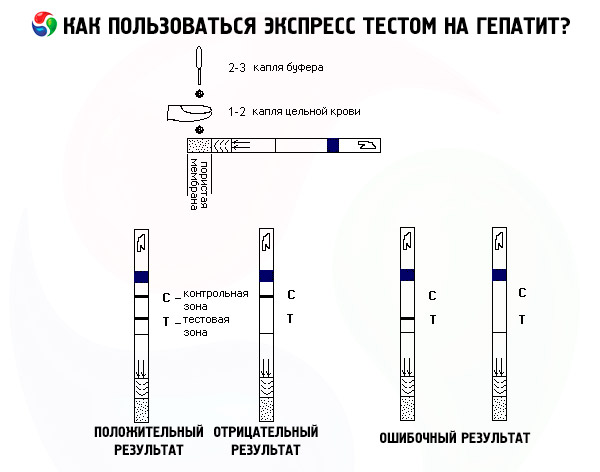Medical expert of the article
New publications
Hepatitis rapid test
Last reviewed: 05.07.2025

All iLive content is medically reviewed or fact checked to ensure as much factual accuracy as possible.
We have strict sourcing guidelines and only link to reputable media sites, academic research institutions and, whenever possible, medically peer reviewed studies. Note that the numbers in parentheses ([1], [2], etc.) are clickable links to these studies.
If you feel that any of our content is inaccurate, out-of-date, or otherwise questionable, please select it and press Ctrl + Enter.

Viral hepatitis is an infectious disease in which the inflammatory process caused by infectious agents spreads to liver tissue. This disease is systemic, but mainly the liver is affected. For timely adequate treatment, the disease should be diagnosed in time by taking appropriate tests or using an express test for hepatitis.
Acute viral hepatitis develops after the penetration of pathogenic viruses of several types into the body: A, B, C, D, E, F and G. The most common are viruses of type A, B and C.
This type of research is relatively accessible, since any patient can purchase a rapid hepatitis test in pharmacies without a prescription.
Indications for the procedure rapid hepatitis test
The following factors are indications for the test:
- history of blood transfusion from a donor;
- frequent change of sexual partners without the use of contraceptives;
- intravenous drug use;
- doubts about the quality of sterilization of medical instruments used to perform the intervention;
- blood transfusion before 1992, born between 1945 and 1965 (according to Western doctors regarding hepatitis C );
- preventive medical examination and infection screening.
Preparation
Preparation for the test involves clean skin and generally satisfactory conditions for the test. The room temperature should not be below 10° or above 30°. It is also necessary to make sure that enough time has passed since the possible infection, since it is impossible to detect the presence of infection if the test is performed prematurely. Thus, the incubation period for hepatitis types B and C can last up to six months.
Types of rapid tests for hepatitis
Since there are several types of the disease, there are several variations of rapid tests.
- Rapid test for hepatitis B
This test determines the presence of HBsAg in blood, blood plasma or serum.
- Rapid test for hepatitis C
This test detects the presence of antibodies to the hepatitis C virus in the blood, blood plasma or serum.
- Multi-infection rapid test
The rapid test for HIV, hepatitis (C and B) and syphilis is a quick test that can be used at home to determine the presence of several types of infections in the body.
Technique rapid hepatitis test
The rapid hepatitis test is quite easy to use. Before conducting the test, it is important to keep the test at room temperature for some time. After unpacking, all components of the test should be left on a flat surface. Immediately after this, the test itself is carried out, which consists of the following actions:
- Treatment of the area where the puncture will be made.
You should wash your hands with soap and wipe your finger with the alcohol-based wipe included in the kit.
- Warming up your finger before piercing.
- Prick a finger with a scarifier.
The scarifier must be clean to obtain reliable results.
- Adding blood to the cell.
The test requires two drops of blood sample.
- Adding buffer solution to the cell.
Two drops of solution are required to perform the analysis.

Normal performance
After about 10-15 minutes, you can evaluate the results of the study. After 25-30 minutes, the results may be distorted.
There are three possible options:
- Positive (probably infected with a virus, additional laboratory tests are required for verification) is indicated by the appearance of two stripes in the test field.
- Negative (there are no antibodies to the virus in the patient's blood sample) is indicated by the appearance of one band in the test field.
- An invalid (inconclusive result, the test should be repeated using another test) is indicated by the absence of stripes in the test field or other variations (for example, if a second strip appears, indicating the presence of the virus in the blood, but the first strip does not appear)
According to doctors' reviews, a rapid test for hepatitis in most cases (99%) shows a reliable result, however, if the result is positive, repeated tests are mandatory in a medical institution to confirm the diagnosis.
Reliability and accuracy of rapid hepatitis test
The reliability and accuracy of a rapid test for hepatitis depends on how correctly the test was conducted. It should be noted that any test can show a false positive result. Thus, when it comes to whether rapid tests for hepatitis can be trusted, it should be taken into account that if the test result is positive, it is additionally recommended to undergo a similar test in a laboratory.


 [
[